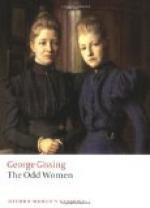‘Not at home—? I think there’s a mistake.’
‘Oh, impossible! We’ll ask Mrs. Conisbee.’
She went to the door and called. From the landlady Widdowson learnt exactly what Monica had said. He reflected for a moment.
’She shall write to you then. Don’t come just yet. I mustn’t stay any longer now.’
And with a mere pretence of shaking hands he abruptly left the house.
Suspicions thickened about him. He would have thought it utterly impossible for Miss Madden to disgrace herself in this vulgar way, and the appalling discovery affected his view of Monica. They were sisters; they had characteristics in common, family traits, weaknesses. If the elder woman could fall into this degradation, might there not be possibilities in Monica’s character such as he had refused to contemplate? Was there not terrible reason for mistrusting her? What did she mean by her message to Virginia.
Black and haggard, he went home as fast as a hansom could take him. It was half-past five when he reached the house. His wife was not here, and had not been here.
At this Moment Monica was starting by train from Bayswater, after her parting with Bevis. Arrived at Victoria, she crossed to the main station, and went to the ladies’ waiting-room for the purpose of bathing her face. She had red, swollen eyes, and her hair was in slight disorder. This done, she inquired as to the next train for Herne Hill. One had just gone; another would leave in about a quarter of an hour.
A dreadful indecision was harassing her. Ought she, did she dare, to return home at all? Even if her strength sufficed for simulating a natural manner, could she consent to play so base a part?
There was but one possible alternative. She might go to Virginia’s lodgings, and there remain, writing to her husband that she had left him. The true cause need not be confessed. She would merely declare that life with him had become intolerable to her, that she demanded a release. Their approaching removal to Clevedon offered the occasion. She would say that her endurance failed before that prospect of solitude, and that, feeling as she did, it was dishonourable to make longer pretence of doing her duty as a wife. Then, if Bevis wrote to her in such a way as to revive her love, if he seriously told her to come to him, all difficulties could be solved by her disappearance.
Was such revival of disheartened love a likely or a possible thing? At this moment she felt that to flee in secret, and live with Bevis as he proposed, would be no less dishonour than abiding with the man who had a legal claim upon her companionship. Her lover, as she had thought of him for the past two or three months, was only a figment of her imagination; Bevis had proved himself a complete stranger to her mind; she must reshape her knowledge of him. His face was all that she could still dwell upon with the old desire; nay, even that had suffered a change.




